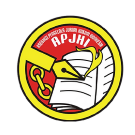Efektivitas Penyelenggaraan Klaim Jaminan Kematian BPJS Ketenagakerjan Atas Kematian Pekerja Migran Indonesia Di Jawa Timur
Abstract
Work is the primary need of every human being. By working, they will get a salary or wages that becomes the exchange rate to buy various necessities for life. But unfortunately, the fact is that getting a job in Indonesia is not an easy thing. This encourages people, especially those with education from elementary school to high school, to look for job opportunities abroad. From an economic perspective, the rapidly growing world market and the influence of globalization have opened up demand for workers in foreign economic sectors. Migrant workers act as accomplices and agents of economic and social progress in their country of origin and their country of placement. However, they are also very vulnerable to risks that can result in death. In this regard, the state is responsible for providing proper welfare for its citizens by providing services to Indonesian Migrant Workers through the BPJS Ketenagakerjaan Death Security. The heirs will receive cash benefits if Indonesian migrant worker dies. However, in practice, each BPJS Ketenagakerjaan branch office has its own regulations regarding the procedure for claiming death benefits. In this case, the BPJS Ketenagakerjaan Branch of Karimun Jawa in East Java provides file requirements that differ from the Regulation of the Minister of Manpower and Transmigration Number 18 of 2018 concerning Social Security for Indonesian Migrant Workers, which impedes the heirs. Furthermore, the level of education and family members of the Indonesian migrant workers from small towns prevent them from learning about the Death Insurance Claim procedure at BPJS Ketenagakerjaan Karimun Jawa.
Keywords
Full Text:
PDFReferences
Ananta, Aris. Masalah Penyerapan Tenaga Kerja, Prospek, Dan Permasalahan Ekonomi Indonesia. Jakarta: Sinar Harapan, 2008.
Atmaja, Hamdan Tri. “Model Pemberdayaan Keluarga Tenaga Kerja Wanita (TKW) Indonesia Berbasis Arena Produksi Kultural Dalam Upaya Menciptakan Keluarga Mandiri Sejahtera Di Propinsi Jawa Timur.” Universitas Negeri Semarang, 2014.
Badan Nasional Penempatan dan Perlindungan Pekerja Migran Indonesia. “Statistik Perlindungan Dan Penempatan,” 2022. www.bp2mi.go.id/statistik-perlindungan-dan-penempatan/.
Badan Pusat Statistik. “Tingkat Pengangguran Terbuka Menurut Provinsi (Persen),” 2022. https://www.bps.go.id/indicator/6/543/2/tingkat-pengangguran-terbuka-menurut-provinsi.html.
Daftar Pustaka. “Pengertian TKI, Hak, Dan Kewajiban TKI,” 2021. http://www.daftarpustaka.web.id/2015/04/pengertian-tki-hak-kewajiban-tki.html.
DPR RI. Undang-Undang Nomor 18 Tahun 2017 Tentang Perlindungan Pekerja Migran Indonesia (2017).
———. Undang-Undang Nomor 24 Tahun 2011 Tentang BPJS Ketenagakerjaan (2011).
———. Undang-Undang Nomor 40 Tahun 2004 Tentang Sistem Jaminan Sosial (2004).
———. Undang-Undang Nomor 39 Tahun 2004 Tentang Penempatan dan Perlindungan Tenaga Kerja Indonesia di Luar Negeri (2004).
Efendi, Joenadi. Metode Penelitian Hukum Normatif Dan Empiris. Jakarta: Paramedia Grup, 2016.
Heriyanto, Dodik Setiawan Nur. “Klausula Terkait Perlindungan Terhadap Buruh Migran Dan Urgensinya Untuk Diatur Secara Khusus Di Dalam Perjanjian Perdagangan Bebas Antara Asean Dan Uni Eropa.” Jurnal Hukum Ius Quia Iustum 22, no. 3 (July 2015): 329–45. https://doi.org/10.20885/iustum.vol22.iss3.art1.
Menteri Ketenagakerjaan dan Transmigrasi. Peraturan Menteri Ketenagakerjaan dan Transmigrasi Nomor 18 Tahun 2018 Tentang Jaminan Sosial Pekerja Migran Indonesia (2018).
Soekanto, Soerjono. Pengantar Penelitian Hukum. Jakarta: UI-Press, 1989.
Sumarsono, Sonny. Teori Dan Kebijakan Publik Ekonomi Sumber Daya Manusia. Yogyakarta: Graha Ilmu, 2009.
Susetyorini, Peni. “Perlindungan Tenaga Kerja Indonesia (TKI) Di Luar Negeri Oleh Perwakilan Republik Indonesia.” Masalah-Masalah Hukum XXXIX, no. 1 (2010).
Waluyo, Bambang. Penelitian Hukum Dalam Praktik. Jakarta: Sinar Grafika, 2002.
DOI: http://dx.doi.org/10.51825/sjp.v2i2.16323
Refbacks
- There are currently no refbacks.
Copyright (c) 2022 Sultan Jurisprudence: Jurnal Riset Ilmu Hukum
Telp. (0254) 280330 Ext. 218, Fax.: (0254) 281254
Website: https://jurnal.untirta.ac.id/index.php/jurisprudence
E-mail : [email protected]
OPEN ACCESS POLICY

This work is licensed under a Creative Commons Attribution-ShareAlike 4.0 International License.
















.png)